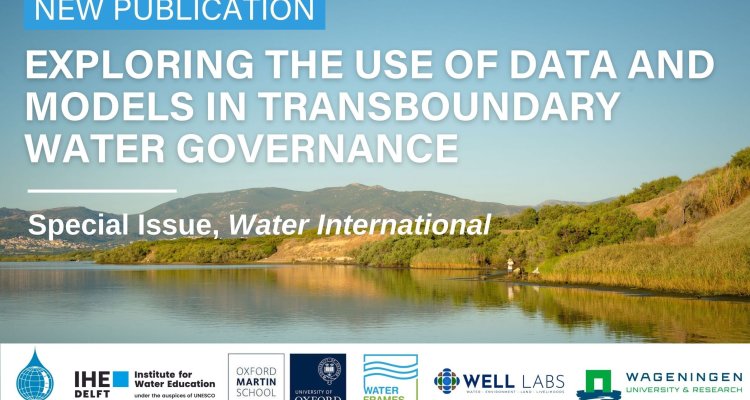
News
WRM's PhD candidate Rozemarijn ter Horst as a guest editor of the Special Issue “Exploring the use of data and models in transboundary water governance”
We celebrate the launch of the special issue on ‘Exploring the use of data and models in transboundary water governance’, hosted by Water International. A webinar will be organised in the following months, to discuss the lessons from the Special Issue. More news will follow.
Newer methods of data collection and processing, including remote sensing and artificial intelligence, are already influencing knowledge development and decision-making over transboundary waters. Their introduction and use requires a conscious engagement with these new tools in politically sensitive situations.
Surprisingly, there are very few examples of scientific articles that detail the everyday practice of creating and using data and data-driven tools for transboundary water governance. There is a lot to learn, but few lessons are shared publicly. As guest editors we have initiated this special issue to promote learning from experiences. Subsequently, the large majority of research articles and technical notes in this special issue are practice based. We are able to draw lessons from around the world, including North and South America, Western Europe, Asia, and Africa.
The contributions show that success of data- and modelling-driven project rely heavily on investing in relations between people and institutions, data and models along with critical technologies. We broadly draw four lessons from the case studies to help navigate relations between people and institutions and the use of data and models in transboundary waters:
- Layer up: When engaging with data and data-driven tools for transboundary water management, include different levels of decision making from the start.
- Communication is key: Investing in communication and data-sharing remains essential, while recognizing that data and data-driven tools are no easy fixes but require careful implementation.
- Engage people first, and model second: Early engagements and developing agreements with stakeholders are investments towards success in the longer run and can prevent a future breach of trust.
- Take time for transdisciplinarity: most authors of this special issue have learned to cross disciplinary boundaries, and connect practice and science, through their practice. Such expertise is a requirement for success in projects on data exchange and modelling for water cooperation.
- ‘Do needs motivate the exchange of data in transboundary waters? Insights from Africa’s shared basins’, by Patience Mukuyu, Jonathan Lautze, Alistair Rieu-Clarke, Davison Saruchera and Matthew McCartney
- ‘Lake Victoria water levels declining (2000-2006): the role of absent and uncertain data in a transboundary water controversy, by David Kipyegon Bosuben, Uta Wehn and Pieter van der Zaag
- ‘Open-access remote sensing data for cooperation in transboundary water management’, by Seleshi G. Yalew, Pieter van der Zaag, Bich N. Tran, Claire I. B. Michailovsky, Elga Salvadore, E. Borgomeo, Poolad Karimi, Sajid Pareeth, Solomon D. Seyoum and Marloes L. Mul
- ‘Dam operation using satellite data and hydrological models: the case of Roseires dam and Grand Ethiopian Renaissance Dam in the Blue Nile River’, by Mohamed A. Hassan, Mahmoud F. Hassan, Yasir A. Mohamed and Wail A. Awad
- ‘Data-sharing and decision support system to improve governance in transboundary waters in the La Plata River basin’ (Editor’s choice), by Isabela Battistello Espíndola and Luis Paulo Batista da Silva
- ‘Using data collection to build trust and ownership in transboundary water allocation planning: a case study from the Mara River Basin’, by Lauren Zielinski, Michael McClain, William Ojwang, Christian Joseph, David Tickner, Gordon Mumbo, Ali Said Matano, Joel Nobert and Annette Huber-Lee
- ‘Does data lead to cooperation? Lessons from Water Accounting Plus in the Cauvery basin, India’, by Rozemarijn ter Horst, Claire I. Michailovsky, Elga Salvadore and Chaitanya K. S.
- ‘Developing the transboundary Long Term Vision of the Scheldt Estuary – an untold story’, by Jill H. Slinger
- ‘Basin-wide knowledge exchange for the sustainable management of the Colorado River’, by Kevin G. Wheeler, Terrance Fulp and Roberto F. Salmon-Castelo
To celebrate the launch of the special issue on ‘Exploring the use of data and models in transboundary water governance’, hosted by Water International, one article is selected as Editors’ choice and free for a selected period of time. We selected the article by young researchers Isabela Battistello Espíndola and Luis Paulo Batista da Silva on ‘Data-sharing and decision support system to improve governance in transboundary waters in the La Plata River basin’.
The La Plata case is a good example where the problems of asymmetric information and lack of institutional knowledge sharing between the five riparian countries were addressed through the development of a joint Decision Support System (DSS). The development of a platform for technical and scientific cooperation supported the countries in harmonising data, making data and information accessible and enabling joint assessments. In doing so, it supports improved stakeholder participation and joint decision-making, which also builds trust between countries. The DSS is thus a great support for cooperation between countries and for the coordination of basin management measures in each country.
Thank you!
We want to thank all contributors and in particular those who have worked on these articles in difficult times, including the civil war in Sudan and through the COVID pandemic.
Figure: La Plate Basin, Made by K Musser, 2010.